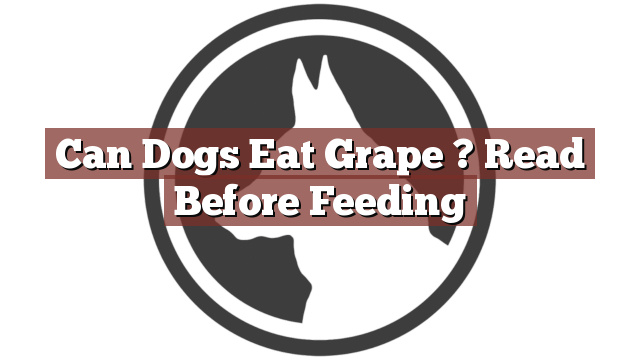Understanding Your Dog’s Dietary Needs
As a responsible pet owner, it is crucial to understand your dog’s dietary needs. Dogs have specific nutritional requirements that differ from humans, and it is essential to provide them with a balanced diet to ensure their overall health and well-being. While some human foods can be safe for dogs to consume, it is important to remember that not all foods are suitable for our furry friends. One common food that raises questions among dog owners is grapes.
Can Dogs Eat Grape? Read Before Feeding
Can dogs eat grapes? This is a question that often arises among dog owners. The answer is a resounding no. Grapes, and their dried counterparts, raisins, can be highly toxic to dogs. Even a small portion of grapes or raisins can lead to serious health complications for your canine companion. The reason behind this toxicity is still unknown, and not all dogs will have the same reaction to grapes or raisins. However, it is better to err on the side of caution and avoid feeding your dog grapes altogether.
Pros and Cons of Feeding Grapes to Your Dog
Feeding grapes to your dog can have severe consequences. Grapes and raisins have been linked to kidney failure in dogs, which can be life-threatening. Symptoms of grape or raisin toxicity may include vomiting, diarrhea, loss of appetite, abdominal pain, weakness, and increased thirst and urination. In some cases, dogs may also exhibit symptoms of lethargy, tremors, or seizures. It is crucial to seek immediate veterinary assistance if you suspect your dog has ingested grapes or raisins.
While there are no known benefits of feeding grapes to dogs, it is important to note that not all fruits are harmful to them. Many fruits, such as apples, bananas, and blueberries, can be a healthy and safe treat for your furry friend. However, it is always recommended to consult with your veterinarian before introducing any new food into your dog’s diet.
Conclusion: Grape Consumption and Your Dog’s Health
In conclusion, dogs should not be fed grapes. The potential risks and toxicity associated with grape consumption outweigh any perceived benefits. It is crucial to prioritize your dog’s health and well-being by providing them with a balanced diet that meets their specific nutritional needs. If you have any concerns or questions regarding your dog’s diet, it is always best to consult with your veterinarian for professional advice. Remember, a well-informed and responsible pet owner is key to keeping your furry friend happy and healthy.
Thank you for taking the time to read through our exploration of [page_title]. As every dog lover knows, our furry friends have unique dietary needs and responses, often varying from one canine to another. This is why it's paramount to approach any changes in their diet with caution and knowledge.
Before introducing any new treats or making alterations to your dog's diet based on our insights, it's crucial to consult with a veterinarian about [page_title]. Their expertise ensures that the choices you make are well-suited to your particular pet's health and well-being.
Even seemingly harmless foods can sometimes lead to allergic reactions or digestive issues, which is why monitoring your dog after introducing any new food item is essential.
The content provided here on [page_title] is crafted with care, thorough research, and a genuine love for dogs. Nevertheless, it serves as a general guideline and should not be considered a substitute for professional veterinary advice.
Always prioritize the expert insights of your veterinarian, and remember that the health and happiness of your furry companion come first.
May your journey with your pet continue to be filled with joy, love, and safe culinary adventures. Happy reading, and even happier snacking for your canine friend!

